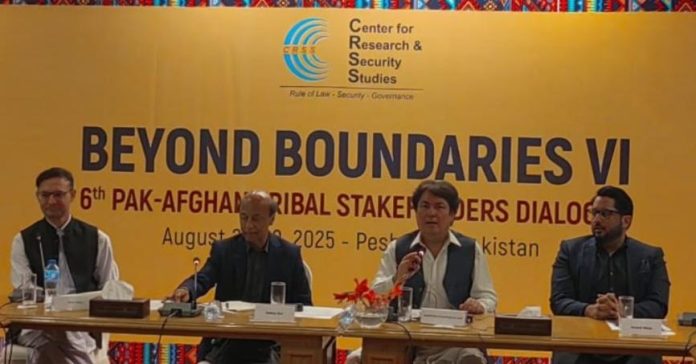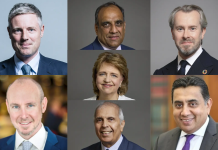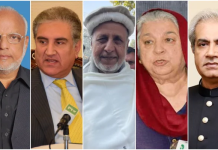ISLAMABAD, AUG 29 /DNA/ – Jirga, comprising representatives from both sides and leveraging people-to-people linkages at the local level, is essential to address contentious issues between Pakistan and Afghanistan. If formal communication channels are stalled or serve as an obstruction, jirga- the people – must undertake responsibility, step forward, and actively seek resolution. The local linkages, empowered with the mandate for conflict resolution mission, have a great potential to overcome challenges encountered between both and on respective sides.
The Khyber Pakhtunkhwa government is still trying to take a representative jirga to Kabul. Tribal representatives, as voicesof the people and members of civil society, should rise above the contentious positions and actively pursue conflict resolution.
These remarks were made by the Advisor to the Chief Minister, Khyber Pakhtunkhwa on Information and Public Relations, Barrister Dr. Muhammad Ali Saif, during the 6th round of Pak-Afghan Tribal Stakeholders Dialogue on Regional Stability and Economic Connectivity, organized by the Center for Research and Security Studies (CRSS), as part of its multitrack diplomacy initiative Beyond Boundaries.
Barrister Saif said that Pakistan and Afghanistan need good relations not just as a matter of neighbours but as a matter of fact that war benefits none. He emphasized the urgency of shifting the paradigm of bilateral engagement from one based on power to one based on shared interests: “We need to change our paradigm of engagement with each other; the Pak-Afghan relationship requires an “Interest Paradigm”rather than “Power Paradigm”, since the former aims to exert control through power whereas the latter aims the creation of shared interests and serious stakes for peace and cooperation with each other”.
Chief Customs Wing, FBR Islamabad, Mr. Arbab Qaiser said that since the Taliban’s takeover, Pakistan has made serious efforts to strengthen trade and transit relations with Afghanistan. Given that Afghanistan’s exports rely heavily on agriculture, Pakistan has extended facilitation in this sector.In recent years, Afghanistan’s reverse cargo volume has increased significantly. In the interest of facilitating each other to connect with the Central Asian countries for regional trade, Pakistan Embassy has issued thousands of visas to Afghan drivers, facilitated Afghan traders at multiple border crossing points, expanded loading facilities at Ghulam Khan, and is in the process of digitizing the entire system. These reforms, including the introduction of an automated clearance system, will reduce processing time to 12 hours.
Arbab emphasized that Afghanistan should also move toward digitizing its systems to ensure smoother facilitation for Pakistani traders and to achieve mutual gains in bilateral trade.
The President of Frontier Customs Agents Association (FCAA), Zia-ul-Haq Sarhadi criticized the frequent border closures and inconsistent trade policies on both sides, adding that the Infrastructure Development Cess (IDC) imposed by the KP government violates international conventions by burdening Afghanistan, a landlocked country.
“The IDC has diverted a large volume of export business to other provinces and countries, negatively impacting both bilateral trade and the regional economy”.
Echoing Sarhadi’s point, Fazl Moqeem Khan, President of Sarhad Chamber of Commerce and Industry,emphasized that the private sector should act as a partner to governments on both sides rather than engaging in counterproductive disputes.
Sadiq Hussain, Economist and Trade Specialist, Khyber Pass Economic Corridor (KPEC) noted that KPEC can be a game-changer in the coming decade, provided that both sides cooperate and ensure meticulous planning and implementation. It can virtually transform the transport corridor into an economic corridor where the entire region will reap benefits from the development of basic infrastructure key to trade, transit trade, and communication.
The participants from both sides noted that the potential that lies in the people-to-people side of ties between Pakistan and Afghanistan should not be ignored, as it can create some serious stakes for cooperation as part of all other areas of the relationship.Forced deportation can take a serious toll on the people-to-people side of relationship.The safety and dignity of Afghan refugees demand a phased repatriation plan, not unilateral and exclusive. With security and economic woes already mounting, the region cannot afford the weight of a humanitarian crisis.
Two foremost hurdles to stable bilateral ties are the stringent visa regime and bureaucratic bottlenecks impeding the realization of a free trade zone, which has immense potential for the entire region.
Terrorism has made life unbearable for people in tribal regions. It is a multifaceted issue that has affected their social life, economy, education, and political landscape. Politics and the economy are interrelated. Economic connectivity and prosperity cannot be achieved without robust political engagement.
“Refugees and migrants deserve dignity and humane treatment – Pakistan must exhibit goodwill in their case”, said thePakistani tribal representative, Aisam Ud Din. He added that the developed countries, the UN, Pakistan, all should help the de facto Afghan government in the rehabilitation of the refugees. A strong and stable Afghanistan means a strong and stable Pakistan. Our stability is interconnected and hence should be a mutual goal.
“It’s proven that wars cannot solve our issues – dialogue is the only way out”, saidMolana Abdur Rasheed from Bajaur. He added that only a comprehensive, authoritative, all-inclusive dialogue will lead us to lasting peace and not patchwork fixes like area settlements.
The dialogue was participated by tribal elders, community leaders, and members of the business community from Pakistan and Afghanistan, with both sides unanimously emphasizing the need for dialogue to resolve differences and establish lasting peace in the region.

















